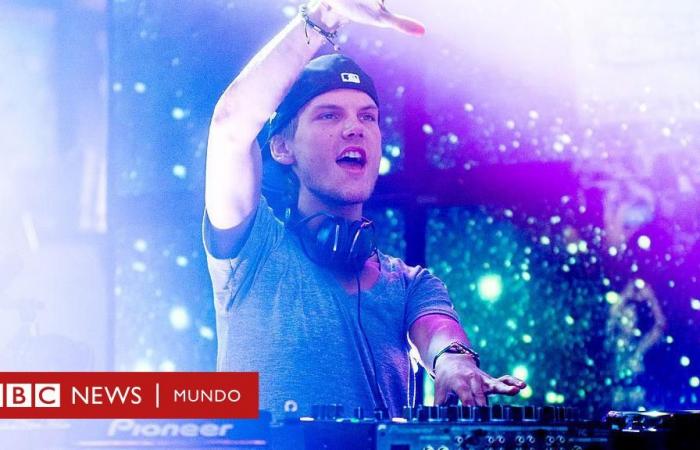
Image source, Getty Images
- Author, Alex Taylor
- Role, BBCNews
-
47 minutes
On April 20, 2018, the world lost a music superstar, Swedish DJ Avicii, who was topping the charts at the time.
At just 28 years old, he tragically took his own life while on vacation in Oman.
While fans lost an artist, Klas Bergling lost his son Tim.
“I miss him every minute,” Klas shares during a candid and deeply personal video call.
“Of course, I talk to him every day. But I admit, sometimes I get angry with him. Why did you do it? Why did you leave us?” he adds.
Avicii rose to fame as explosively as the synths that bounced on his famous song Levels.
The song, which he released in 2011, features the upbeat chorus “I feel good” by Etta James, and catapulted the then 22-year-old Swede to pop stardom.
Over the next five years, as club dance music evolved into the ubiquitous and well-received genre known as EDM, with Levels as an anthem, Avicii became the blonde, high-cheekbone model of this music.
He allegedly earned $250,000 a night performing on his tours.
But at 26 years old retired from live shows.
In a personal note to his fans, he referenced his physical and mental health without detailing the entirety of his struggles, which involved anxiety, pancreatitis, addiction to alcohol and painkillers.
Image source, Getty Images
Despite a period of recovery (producing music away from the spotlight), Tim continued to battle his inner demons; He was looking for answers to his existential questions.
Two years later, his problems took hold of him for the last time, fatally.
Now, his family wants people to know Tim beyond the stage lights and has launched an illustrated book to honor his legacy.
Through the Tim Bergling Foundation, created in his memory in 2019, they want to open the conversation about the mental health crisis in young people.
A millennial rise
Klas, who carefully selected the photographs from Tim’s childhood to his superstar life, explains: “We want to help people see beyond Avicii’s fame. That’s why we also called his posthumous album ‘Tim’.”
Reflecting on the deep connection fans still feel, demonstrated by the thousands of letters and memorial messages they leave on his website, the artist’s father says: “Tim meant a lot to young people: his music, his lyrics and his person.” .
“At first I didn’t understand why, but then a fan said, ‘Tim was authentic.’ I understood. A lot of young people identify with that authenticity, his honesty and his struggles.”
The DJ found fame the millennial way, posting songs online.
He adopted the name Avicii in 2008, a reference to the different “levels” of Buddhist hell after discovering that his own name had been adopted by someone else on MySpace.
Image source, Getty Images
He was briefly signed to BBC Radio 1 DJ Pete Tong after winning a talent show and caught the attention of DJ Laidback Luke by posting on his forum.
But Tim struggled with anxiety from an early age, often having catastrophic thoughts and fearing cancer.
The alcohol
Klas remembers that Tim had intense “identity issues” during his teenage years. After a few meetings with a psychologist, he felt better.
However, the tours exacerbated his anxiety.
A text message in Tim’s biography published in 2021 revealed the concerns Klas had: “Hi Tim, I hope your inspiration is enough for this great tour, with concerts every day. You have to pause and breathe a little, but it’s your choice. Hugs and kisses. Your old man.”
The hectic schedule took its toll.
While Levels garnering nearly 20 million views on YouTube before its official release, Tim’s tour included performances in the US, New Zealand, Australia and Asia, and he often performed multiple shows in different cities on the same day.
To calm your nerves, turned to alcoholl.
“I found the magic cure of just having a couple of drinks before continuing,” he said in the documentary Avicii: True Stories.
This dependency grew as I traveled. He told GQ magazine in 2013: “You travel, you live out of a suitcase, you get to this place, there’s free alcohol everywhere.”
In 2012, he embarked on a 26-day tour of the United States, which caused him stomach pains due to his alcohol consumption, which led to hospitalization and a prescription for opioids to calm his pancreatitis, beginning a cycle of health problems. and addiction.
The following year, in Australia, he had pancreatitis again, but refused to have his gallbladder removed to avoid canceling his engagements and was prescribed opioids again.
Image source, Getty Images
His appendix eventually ruptured, forcing him to undergo surgery.
Klas emphasizes the need for a systemic change in the music industrybut is careful to cast individual blame.
“I still think that record labels, people who tour, agents and managers should have a driver’s license to show that they are fit. That’s how artists should be treated,” he says.
While he acknowledges some positive changes since Tim’s death, noting that “the Swedish managers of the big labels are more aware today,” he stresses that comprehensive measures are needed to ensure the well-being of artists.
Survivor’s guilt
Tim’s health problems coincided with his commercial success (now Grammy nominated). Their debut album Truewhich introduced country sounds, produced hits as Wake Me Up and Hey Brother.
In 2015, his mental state had deteriorated due to pill abuse. She had angry outbursts and erratic behavior.
Despite promising that their second album Stories would be the best, their struggles led to delays, onstage nihilism, and confrontations with paparazzi.
That summer, Klas and his team knew something had to be done.
With a therapist they planned an intervention in Ibiza. In an interview with the Times, Klas said he felt he had betrayed his son.
Image source, Getty Images
“You are faced with your son, who is completely unaware of what is going to happen,” he answers to the BBC when we ask him about this comment.
And he adds that Tim’s anguished reaction was evident. “He realized that something was being planned behind his back.”
But it was necessary, says Klas. “There was no doubt that we should do it, but getting to that point is not easy.”
Tim, always stubborn, seemed confused, thinking he was being criticized even though he worked tirelessly.
After hours of resisting, he agreed to go to rehab, telling Klas, “I had decided hours ago, but I just wanted to test you.”
Klas smiles and is proud of his son’s “bravery.” After rehab, Tim struggled to escape what he described as the “machine that was Avicii” and stopped working with his manager.
The documentary Avicii: True Stories, completed before his death, showed Tim on a beach, seemingly at peace and not on tour. The reality of his suicide had to be added as a jarring postscript.
Klas admits that the pain is compounded by the fact that “my wife and her brothers and sister were happy that I was improving in many ways.”
“It may sound contradictory, but that’s how it was: I was getting better.”
Klas explains that guilt is “a very big burden” for survivors, who often ask, “What have I done wrong?”
He recognizes that, as therapists have told him, “many times nothing can be done.”
And remember that you can receive notifications in our app. Download the latest version and activate them.





